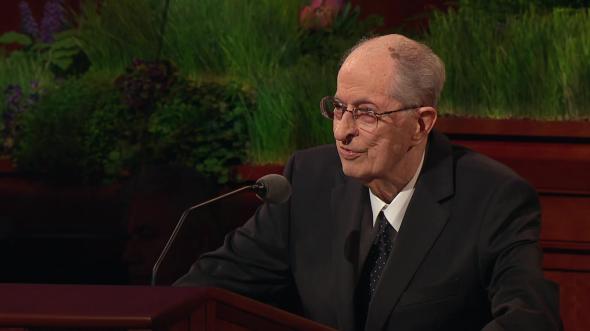Elder Russell M. Nelson as a member of the Quorum of the Twelve Apostles said in October conference 2002: “Among the most memorable of all our family activities have been trips to the Holy Land. For us, visits to that part of the world have been life changing. But now the Holy Land is a cauldron of turmoil and off-limits to those who would like to go there for spiritual enrichment. Virtually all parts of the world are plagued by acts of terror previously unknown. Confusion comes to many who pray for peace but fearfully face this foe of terror.
Peace versus Contention
The perilous times in which we live have been prophesied in the scriptures. Our day has been foreseen as one with “fires, and tempests, and vapors of smoke in foreign lands; … wars, rumors of wars, and earthquakes in divers places … great pollutions upon the face of the earth; … and all manner of abominations.”1
That prophecy echoes an earlier scriptural account of the second generation of human life 2 see below upon the earth: “In those days Satan had great dominion among men, and raged in their hearts; and from thenceforth came wars and bloodshed; and a man’s hand was against his own brother, in … seeking for power.”3 From the days of Cain and Abel,4 Esau and Jacob,5 and Joseph who was sold into Egypt,6 the flames of hostility have been fueled by family feuding.
Hatred among brothers and neighbors has now reduced sacred cities to sites of sorrow. When I think of the plight of such places, I am reminded of an ancient proverb: “Scornful men bring a city into a snare: but wise men turn away wrath.”7
Doctrinal Direction
Scripture sheds light on both the cause of and the cure for the sickness of human hatred: “The natural man is an enemy to God, and has been from the fall of Adam, and will be, forever and ever, unless he yields to the enticings of the Holy Spirit, and putteth off the natural man and becometh a saint through the atonement of Christ.”8
Peace can prevail only when that natural inclination to fight is superseded by self-determination to live on a loftier level. Coming unto Jesus Christ as the “Prince of Peace”9 is the pathway to peace on earth and goodwill among men.10 He made a promise to us: “Blessed are the peacemakers: for they shall be called the children of God.”11
Jesus taught people how to live with one another. He declared the two great commandments: first, to “love the Lord thy God with all thy heart, and with all thy soul, and with all thy mind,”12 and the second, to “love thy neighbour as thyself.”13 Then He added, “Love your enemies, [and] bless them that curse you.”14
He taught the Golden Rule: “All things whatsoever ye would that men should do to you, do ye even so to them.”15 This principle is found in nearly every major religion. Others such as Confucius and Aristotle have also taught it.16 see below After all, the gospel did not begin with the birth of the Babe in Bethlehem. It is everlasting. It was proclaimed in the beginning to Adam and Eve. Portions of the gospel have been preserved in many cultures. Even heathen mythologies have been enriched by fragments of truth from earlier dispensations.
Wherever it is found and however it is expressed, the Golden Rule encompasses the moral code of the kingdom of God. It forbids interference by one with the rights of another. It is equally binding upon nations, associations, and individuals. With compassion and forbearance, it replaces the retaliatory reactions of “an eye for an eye, and a tooth for a tooth.”17 If we were to stay on that old and unproductive path, we would be but blind and toothless.18 see below
This concept of treating others as one would like to be treated is easy to understand. And it acknowledges the precious nature of each of God’s sons and daughters.19 Scripture asks parents to teach children not to “fight and quarrel one with another, and serve the devil, who is the master of sin.” Instead, we “teach them to love one another, and to serve one another.”20
Jesus taught the importance of reconciliation and resolution of dispute on a personal basis. He said: “Whosoever is angry with his brother … shall be in danger of the judgment. …“Therefore if thou bring thy gift to the altar, and there rememberest that thy brother hath ought against thee;“Leave there thy gift before the altar, and go thy way; first be reconciled to thy brother, and then come and offer thy gift.”21 The Master Teacher taught us to “forgive, if ye have ought against any: that your Father also which is in heaven may forgive you your trespasses. “But if ye do not forgive, neither will your Father which is in heaven forgive your trespasses.”22 Jesus declared that a day of judgment would come. All individuals will give an account of their mortal lives and of how they have treated other people.23 see below For Elder Nelson’s complete talk go to: ‘Blessed Are the Peacemakers’
To be continued…






Trackbacks/Pingbacks